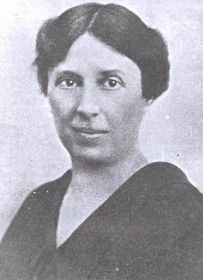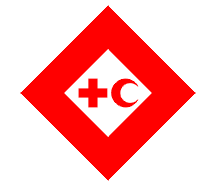Alice Masarykova was born on May 3 1879, the first child of the future founder and first president of Czechoslovakia, Tomas Garrigue Masaryk and his American wife Charlotte[1].
Josef Svejnoha is a leading figure in the Czech Red Cross, an organisation with which Alice Masarykova was closely associated. He filled me in on the details of her life at the Czech Red Cross’s office on Prague’s Thunovska street, just below Prague Castle – by the way, the building was once Alice Masarykova’s home.

“Alice Masarykova was born in Vienna. They moved to Prague when she was three. She spoke Czech because her father was Czech of course but she was also in a German environment in Vienna and learned German. She spoke English too because her mother was American.”
T.G. Masaryk was a strict father and he and his wife Charlotte brought their children up according to humanist prinicples. As well as Alice, they had two sons Jan – the future Czechoslovak foreign minister and Herbert – who went on to become an artist – and another daughter, Olga.
Alice Masarykova went to school in Prague, first to an all-girls primary school on Vodickova street and then to the Minerva grammar school, which was also for girls only. It was unusual for girls to go to university in those days, but then Alice came from an unusual family. Josef Svejnoha again.
“She started studying medicine because she’d wanted to be a doctor from the age of eight. She was accepted by the medicine faculty where she was the only girl in a class of fifty boys. She was a bit handicapped by the fact she was short-sighted and wouldn’t wear glasses. She then switched to the arts faculty where she graduated as a doctor of history in 1903. After that she worked as a teacher.”
Alice Masarykova began her teaching career after completing a post-graduate course in social care in the United States – she taught at secondary schools in Ceske Budejovice and Prague. At the same time, she began her involvement in the Red Cross movement. That involvement was to intensify with the onset of World War I, but not before Alice Masarykova – at the age of 35 – spent a period behind bars.
“During World War I – in 1914 – when her father Tomas Garrigue Masaryk emigrated, he left a message, for the police too, for his papers to be hidden and his family not to know where they were. However, during a search they did of Masaryk’s flat they arrested Alice Masarkyova and she was imprisoned in Vienna for nine months. She was first sentenced to death, then twelve years in prison. Then under pressure from the American government and people, who organised huge petitions, she was released from prison.”
During the war, Alice Masarykova’s work in the Red Cross had a very hands-on nature – she tended to sick and injured soldiers and civilians. Josef Svejnoha has more.
“Just after the foundation of Czechoslovakia she was elected as a deputy in the National Assembly. In February 1919 she was a founder of the Czechoslovak Red Cross and for the next twenty years she was the chairwoman of the organisation. She was very active in the International Red Cross. After around six years she became the chair of the organising committee of the world-wide conference of social workers.”
In 1921 she represented her National Society at the International Conference of the Red Cross[2]. She was elected to the function of secretary – the only woman of the 11 who filled that role. She participated in the work of “Commission N° V: Organisation Internationale Des Croix Rouges” – essentially an attempt to sort out relations between ICRC and the League.
After her mother’s death in 1923 Alice Masarykova became the woman of the Masaryk house, so to speak and dedicated herself to looking after her father, who was by that time of course the president of Czechoslovakia. But she still found time to do charity work, and not just with the Red Cross – she was also active in the temperance movement of the time.
“She was heavily involved in the abstinence union, against alcohol. She looked at it more from the point of view of the social consequences of excessive drinking – the broken homes, children being brought up badly, unemployment. She saw the issue from the social point of view more than the health point of view.”
Alice Masarykova was instrumental in establishing another institution in Czechoslovakia – Mother’s Day. It was thanks to her that the tradition began in this country; the year was 1926. She also started the Red Cross Easter Silence, a two-minute silence which was observed around the country. In 1948 the tradition was radically transformed into International Red Cross day, and was moved from Easter to May 8 to remove religious connotations.
Around this time she was also a member – the only female one – of the Executive Council of the League of Red Cross. (IFRC Archives, RESUME DE LA REUNION DU COMITE EXECUTIF Mardi, 15 mars 1927″
Her good works also involved working with the Yugoslav architect Jozo Plecnik on the redesign of Prague Castle’s buildings and gardens.
Josef Svejnoha of the Czech Red Cross says that between her charity works and looking after her father, Alice Masarykova perhaps neglected her own personal life.
“She was never married – she was what they call an old maid. You could say she sacrificed herself for others and she did a lot of work for charity. There was no time left for any kind of private life.”
Tomas Garrigue Masaryk died in 1937. Two years later the Germans invaded Bohemia and Moravia – two weeks after the occupation began Alice Masarykova left the country, eventually joining her brother Jan in London.
“When he was ambassador to Great Britain she emigrated there too in 1939 and she lived with him in London. They both moved back to Czechoslovakia in 1945 and she spent the three years till the death of Jan Masaryk living opposite the Foreign Ministry. They met each other often and their relationship was very good.”
Jan Masaryk – by then foreign minister and an enemy of the Communist Party – died in mysterious circumstances not long after the Communists came to power. He was found dead under the window of his office at the Foreign Ministry – we shall never know whether he was, as many believe, pushed. Alice Masarykova spent a few months in Prague after the death of her beloved brother before leaving Czechoslovakia in December 1948.
She first went to Switzerland where she stayed with her sister Olga, who had married there. From there she went to Britain before eventually settling in the United States, where she lived in Florida. Alice Masarykova was never to see her home again. How did she feel about her exile? Josef Svejnoha again.
“Was she bitter about it? Well, she was sad about having to leave Czechoslovakia of course. In the 1950s Radio Free Europe very often broadcast her Christmas, New Year and Easter messages. In America she moved in Czech and Slovak circles a lot.”
Alice Masarykova had always been short-sighted and in 1959, when she was 80 years old, she went completely blind following a stroke. In 1966 her health was deteriorating and she went to live in a Czech old folks home in Chicago. She died in November of that year, at the age of 87. Her ashes were interred in the Masaryk Mausoleum in Chicago. But that was not the end of her story.
“In the 1990s the Czech Red Cross and several other organisations got together and had her urn brought from America to the Czech Republic. A service was held and her urn was placed in the Masaryk family tomb in Lany where Tomas Garrigue Masaryk is, along with his wife Charlotte and their son Jan, her brother. So she lays there too now.”
[1] https://www.radio.cz/en/section/czechs/alice-masarykova
[2] International Conference, Geneva, 1921, https://library.icrc.org/library/docs/DIGITAL/CI_1921_RAPPORT.pdf
